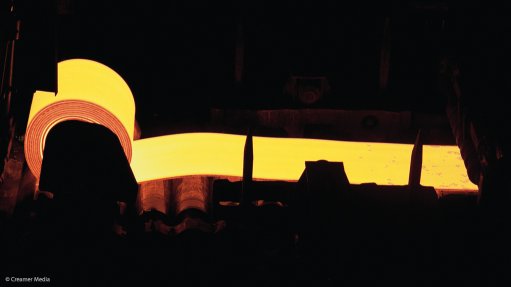
Photo by: Duane Daws
Africa’s largest steel producer ArcelorMittal South Africa (AMSA) partially shrugged off weak domestic market conditions in the first quarter to March 31, 2014, to report a sharp turnaround in headline earnings of R323-million, from a loss of R270-million in the fire-afflicted corresponding period in 2013.
The recovery was supported by 5% higher year-on-year sales of 1.1-million tons and a 21% rise in liquid steel production to 1.2-million tons, which helped lift revenue by 18% to R9.2-billion, as compared with R7.8-billion in the same period last year.
Earnings before interest, tax, depreciation and amortisation improved by R585-million period-on-period to R754-million, supported by a weakening in the rand and “improved competitiveness of iron-ore supply”.
However, acting CEO Dr Hans Rosenstock still described trading conditions as tough, highlighting a particularly weak domestic market during the period. Local sales volumes fell 11% in the period and the group expected the market to remain subdued during the second quarter.
A further weakening of activity in manufacturing and mining was also anticipated, which AMSA said increased the risk that overall economic growth for the year could be lower.
“Coupled with this, the Purchasing Managers Index indicates low levels of confidence in the production sector. These conditions have led to continued weak steel demand, with local producers and end-users facing stiff competition from cheaper imports,” Rosenstock said in a statement to shareholders.
Domestic demand was also likely to be dampened by the recent rise in interest rates, which would negatively affect consumer spending and the affordability of new motor vehicles.
The first quarter turnaround was supported in the main by an increase in average net realised prices and a 70% increase in export shipments.
AMSA said sub-Saharan Africa showed continued growth and strong demand, driven by investments in large infrastructure projects such as mining, roads, rail, housing developments and energy. It was also optimistic about prospects in the oil and gas sector, owing to recent investments.
However, the group’s cash reduced considerably during the quarter, from R1.1-billion to a negative R191-million, owing to the build-up of metal stocks in preparation for a R1.6-billion reline of the Newcastle blast furnace. The project would begin during the current quarter and continue for four months.
“Stocks have been put in place to assure that the domestic demand can be supplied during the project duration of approximately four months. However, production costs will be high, and the market is expected to remain subdued overall. We expect this to negatively impact our results,” Rosenstock warned.